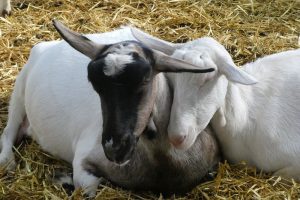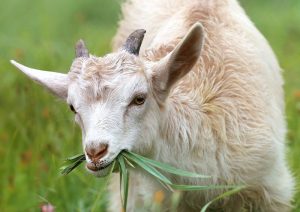What to Know About Goats Getting Fleas
Fleas can be a nuisance to both pets and pet owners. They can inhabit the coats of cats and dogs and leave your animals with irritating itchy bites all over their bodies. Once in your house, fleas can quickly multiply to the point of an infestation. The worst part is that fleas can be very difficult to get rid of. If you have goats you may be wondering whether your goats can get fleas in their coats.
Do goats get fleas? Both short-haired and long-haired goats can get fleas. Goats will usually contract fleas from outdoor areas or by contact with another animal that already has fleas. Your goat may have fleas if they are excessively scratching, rubbing, or biting at their skin.
If you think your goat has fleas, it’s important to take steps as quickly as possible before the flea population turns into an infestation. Acting fast can keep the fleas from multiplying and from spreading to other animals. Keep reading to see how to deal with goats that have fleas.
Does My Goat Have Fleas?
Fleas are tiny creatures that can be hard to find, especially on livestock with thick coats. So, how are you supposed to tell whether or not your goat has fleas? Here are some things to look out for when determining whether or not your goat may have fleas:
Excessive Scratching
Fleas feed off their host’s blood by biting into the flesh. These bites leave behind itchy bumps that can be really uncomfortable. One of the most obvious signs that your goat may have fleas is that they will be excessively scratching. They may also rub against fence posts and rocks and even bite at their skin to relieve the itch.
Excessive scratching can potentially cause open wounds that can get infected. If you notice such wounds on your goat, you know there is a serious problem going on. You can use a goat itch relief product to help relieve your goat from the discomfort and stress.
Irritated Skin
Another way to check your goats for fleas is to examine their skin. Do you notice any irritated areas or red bumps over the goat’s body? Every animal will react differently to fleas, but some goats may have more of a reaction to them and develop red and irritated skin.
While fleas can bite all over the goat’s body, there are certain areas that fleas prefer to others. Check these areas on your goat for any sign of irritated and itchy skin:
- Belly
- Armpits
- Genital Area
- Tail Dock
- Throat
Flea Poop in their Coat
Everyone poops…even fleas. One way you can find evidence of flea existence is by checking your goat’s coat for flea feces. Since most livestock lives outside and tends to get dirty and dusty, it may be difficult to find flea poop unless you know what to look for.
You may find a clump of flea poop around the base of your goat’s hair. The feces will look like black specks. Examine closer to the roots of the hair, as this is where most of the feces will be. I don’t know if fleas like to poop in the same spot over and over again, but their waste tends to gather and clump together, so it can be easier to spot.
Sudden Discomfort Displayed
Whenever I’ve witnessed an animal with fleas, one thing I notice is episodes of sudden discomfort. This may look like your goat relaxing and resting to suddenly jumping up and acting irritated. This irritability can be caused by the fleas moving around or the fleas biting into the goat.
How to Treat a Goat That Has Fleas
While fleas are notoriously difficult to get rid of, you do have some options when it comes to treating a goat that has fleas. There as also preventative measures you can take to keep fleas away from your goats and out of their living area. Taking the appropriate actions and continuing to do so even after it seems like the flea population is gone will ensure that your animals stay healthy and happy.
Bathe or Spray Them With an Insecticide
If your goat has fleas, one of the first things you’re going to want to do is get rid of the living and irritating fleas that are currently on your goat. To do this, you can bathe or spray your goat with an insecticide for goats. Depending on the insecticide you get, it can kill adult fleas and larvae. Here are some insecticides that can be used on goats:
- Diatomaceous Earth Insecticide by DEsect for Livestock & Poultry
- Durvet Permethrin 10%
- Merck 2771694 Ultra Boss Pour-On
Treat Their Sleeping Area With a Larvacide
 Just because you can get rid of all the adult fleas on your goat by using an insecticide shampoo doesn’t mean that they’re completely out of your hair. (haha, get it?) Fleas can lay up to 50 eggs a day! This means there may be a population of flea eggs that you don’t know about until their adults and causing your goats discomfort.
Just because you can get rid of all the adult fleas on your goat by using an insecticide shampoo doesn’t mean that they’re completely out of your hair. (haha, get it?) Fleas can lay up to 50 eggs a day! This means there may be a population of flea eggs that you don’t know about until their adults and causing your goats discomfort.
Many times, fleas will lay eggs wherever your goat sleeps. For this reason, you’ll want to treat your goat’s sleeping area with a larvacide. Larvacide will work to kill eggs and larvae in the sleeping area that could potentially find their way onto your goat. Here are some larvicides that will work for your goat’s sleeping area:
- Natural Chemistry De Flea Pet and Bedding Spray
- Wondercide
- Vet’s Best Flea and Tick Yard and Kennel Spray
Shear Long-Haired Goats
If you have a long-haired goat that has fleas, shearing off their coat can make it much easier to deal with the pests. It will enable you to get rid of a whole bunch of real estate that fleas may have been living in. Secondly, you’ll now be able to be more strategic and accurate with the goat’s treatments.
When you shear your goat, be sure to properly seal away and dispose of the fur. If you leave the sheared coat on the ground, the fleas could easily escape and find another animal. Throw the hair away in a trashcan with a lid, or thoroughly bag it up and remove it from the area.
Replace Bedding
As mentioned above, fleas like to lay eggs and nest where your goat sleeps and rests. For this reason, it’s best to remove and replace your goat’s bedding altogether. Removing the bedding on along with treating the area with larvacide will create a good defense against the flea population.
One of the best ways to prevent fleas from flourishing is to regularly clean. Cleaning your goat’s living area daily can drastically reduce your goat’s chances of getting fleas. If your goats sleep on top of straw, regularly replace it with fresh bedding.
Keep Flea-Ridden Animals Away
There’s nothing worse than having an entire barnyard infected with fleas. Once one animal has fleas, it’s easy for the fleas to spread to the other animals. For this reason, if you notice that one of your farm animals or pets have fleas, you should try and keep them away from the other animals.
If you notice that one of your goats have fleas and it’s been in contact with the other goats, you should go ahead and treat the whole trip. Shear long-haired goats, spray or bathe them with insecticide, removing old bedding, and spray their living area with larvacide. By doing this, you may prevent a major infestation from spreading throughout your goat population.
Strategically Place Flea-Repelling Plants
Did you know that there are certain plants that repel fleas? Strategically placing these plants around your goat enclosure can prevent fleas from coming near. Here is a list of some flea-repelling plants that are safe to use around your goats but also effective at keeping a flea population away:
- Chamomile
- Citronella
- Eucalyptus
- Lemon Grass
- Mint
Place these plants around your goat enclosure or where your goat sleeps. For the most part, these plants can be eaten by a goat without causing any health problems. In fact, many of these plants can be good for your goats and their ability to produce milk. As with anything, eaten at an excessive amount may cause negative health problems in your goat.
Fleas can make your animals truly miserable, so it’s important to treat for fleas as soon as you notice a problem. The quicker you act, your chance of avoiding a complete infestation goes up. Since goats live outside, they are bound to run into pesky insects at one point or another; however, you can keep the pests from becoming a problem.
I hope this article was helpful to you and your goats when it comes to dealing with fleas. We are dedicated to helping you find the answers to your livestock and poultry questions. You can check out some of our other articles here:

